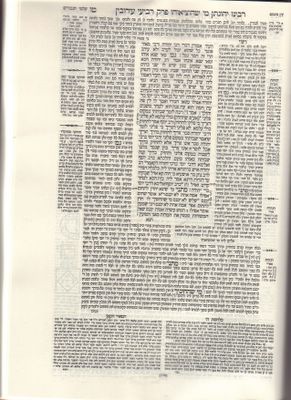
HIDE/SHOW IMAGE
15a
{Eruvin 51b continues}
These are the words of Rabbi Yehuda. And Rabbi Meir says: Whoever could, but did not prepare an eruv, is like an donkey driver and camel driver {such that he is tugged in two directions and so cannot move}.
Gemara:
Why does he differ from them?
Rav Yehuda said: Here, what we are dealing with is a case in which he has two houses, and between them are two techum Shabbat {=4000 cubits}. He, since he went out on his journey, has the status of a poor person. The people of the city, who asked him to set up the eruv on their behalf {in the other town}, are like rich people.
A brayta also says so: One who has two houses, and between them are two techum Shabbat, since he has set out on the road, he acquires in the eruv. These are the words of Rabbi Yehuda. More than this said Rabbi Yossi son of Rabbi Yehuda: Even if his friend found him {along the way} and said "sleep here, it is the time of the {scorching} sun," or "it is a chilly time," the next day he can arise and go.
Rabba said: To say "my Shabbat abode is in place X," (even though he set out), all agree that it is necessary {to actually voice the declaration}. In what do they disagree? Whether it is necessary to actually set out.
And Rav Yosef said: To actually set out, all agree that he must. In what do they disagree? Whether to say {the declaration}. For Rabbi Yehuda holds that he must actually set out on the road and he must say "my Shabbat abode is in place X." And Rabbi Yossi son of Rabbi Yehuda holds that he only needs to set out on the road, but to say, he does not need -- since he has concluded in his heart to rest in place X and has set out on the road, he acquires Shabbat abode in that place.
And the halacha is like Rav Yosef, and according to Rabbi Yossi son of Rabbi Yehuda. For we say: Rav Yehuda, resident of Bartota {our gemara: son of Ishtata} brought a basket of fruit to Rav Natan bar Oshaya. When he {=Rav Yehuda} was departing, he allowed his to descend the stairs and then said to him, "spend the night here." The next day he got up and left,
{Eruvin 52b}
in accordance with Rav Yosef, according to Rabbi Yossi son of Rabbi Yehuda.
{Which is interesting because the gemara suggests this and then suggests that this could be in accordance with Rabba, according to Rabbi Yehuda.}
Mishna:
Whoever went out beyond the bounds, even one cubit, may not enter.
Rabbi Eliezer says, Two he may enter; three he may not enter.
One upon whom night fell when he was outside the techum, even one cubit, he may not enter.
Rabbi Shimon says: Even fifteen cubits, he may enter, for the surveyors do not measure exactly, because of those who err.
It's been a while...
-
I've been blogging a bit on Substack, at Scribal Error. While focused more
on gemara and girsaot, I just had a post on Rationalism and Midrash. Check
ou...
1 year ago



No comments:
Post a Comment